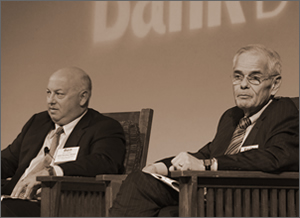
How to Raise Capital in a Difficult Market: What Investors are Looking For
 It goes without saying that community banks have had a tough time raising capital in this environment.
It goes without saying that community banks have had a tough time raising capital in this environment.
One exception is Oritani Financial Corp., a $2.6-billion asset holding company for Oritani Bank in New Jersey, which has raised a total of $413.6 million since 2010.
Kevin Lynch, the company’s chairman, president and CEO, said at Bank Director’s Acquire or Be Acquired conference in Phoenix, Arizona, last month that raising money was an intense marketing effort that required lots of preparation and a good business plan.
Lynch and the bank’s chief financial officer met with 30 institutional investors in four cities over the course of a week.
“The questions come at you like bullets and you’ve got to let them know you’re running the bank and you know what you’re doing,’’ he said. “Your potential investors are going to say ‘does this guy know what he’s talking about?’ You should be prepared to say who your customers are and what your delinquents are and what you’re going to do about them.”
He said investors are interested in knowing whether you can grow organically and how you will deploy the capital. Get to know the investors you are about to meet and learn what their goals are: is it a long term or short term investment for them?
Not all banks have had as good experience raising money as Oritani.
“Access to capital is critical,” said Stifel Nicolaus Weisel Executive Vice President and Vice Chairman Ben Plotkin, whose firm advised Oritani. “For banks trading well below book value, raising capital is a challenge.”
The problem is, a lot of banks are trading below book value. Banks with fewer than $1 billion in assets were trading on average at 72 percent to tangible book value as of mid-January, Plotkin said. That compared to about 120 percent price to tangible book value for banks with more than $1 billion in assets.
On average, larger banks have fewer balance sheet problems, and have had an easier time getting rid of problem loans.
Plotkin said investors are interested in banks with more than $1 billion in assets, with no looming balance sheet hole to plug, attractive demographics and ability to generate loan growth. They want a low level of non-performing assets, a loyal and low cost deposit base, and qualified management with a proven track record, he said.
Lynch also offered some other tips for raising money in the equity markets:
- Have detailed knowledge of your portfolio and plans to build it
- Know your largest loans and customers
- Know all delinquent loans and how you are collecting on them
- Know your asset quality levels, current market conditions and competition
- Provide examples of lending and credit review practices
- Know your loan pipeline and sources
- Know how you will maintain credit quality while ramping up portfolio size


